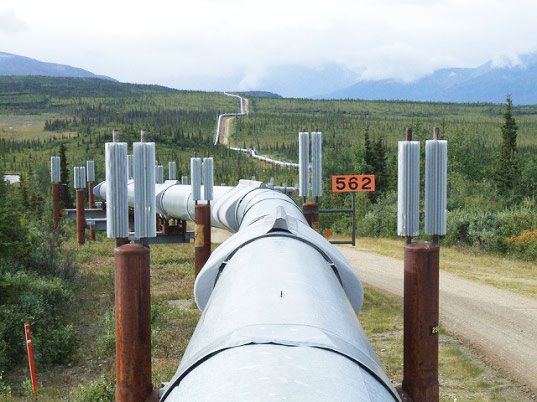Who could have ever envisioned that North America would surpass Saudi Arabia as the world’s biggest maker of oil and regular gas fluids? 10 years back, that would have appeared bizarre.
Yet that is precisely what has happened; and its not simply Saudi Arabia that has been left in North America’s dust – Russia has, as well.
The surge in North American oil and gas creation is seemingly the most vital improvement in vitality throughout the most recent decade. That is the uplifting news. The not very great news is that North America doesn’t have almost enough oil and gas pipelines to suit its 11-million-barrel-a-day yield level.
The broadly uncertain proposed Keystone XL pipeline would convey oil from Canada to the U.s. Bay Coast, yet its future is in legitimate and political limbo. The disputable Northern Gateway pipeline, proposed as an option to Keystone XL, would unite Canada’s oil sands to the Pacific Coast, permitting more prominent volumes of oil to be transported to Asia, however it, as well, is still on the staging phase.
Both are great illustrations of how pipelines – considered the most secure approach to move oil and gas – have gotten to be politicized and investigated, and not without reason. Notwithstanding their dependability, pipelines still prompt an unsuitable rate of security disasters. They consume and burst, which debilitates laborers and close-by groups. In 2013 alone, in excess of 119,000 barrels of oil were spilled in 623 occurrences.
America’s current pipelines are getting more seasoned and more inclined to consumption, and throughout the following five to 10 years, there will be a noteworthy increment in the quantity of new pipelines.
Furthermore that is making a tremendous open door for better pipeline wellbeing innovation.
Observing and catching erosion in pipelines is still an unrefined issue (no joke expected). Pipeline organizations have a tendency to underspend on security, concerned just with gathering the base administrative prerequisites.
One of the real ways pipeline administrators catch erosion is with a “pig,” a machine that goes down within a pipeline searching for issues.
Pigs are not new – the business has since a long time ago depended intensely on them—and the freshest era of pigs, known as “savvy pigs,” is viewed as a change over the pigs of yesterday. Savvy pigs give a read on the state of the pipeline, for example, splits, consumption, and metal misfortune. Administrators get this data in a control room and can then dispatch groups to settle the issue.
Starting 2012, 93 percent of pipeline investigations were led utilizing shrewd pigs.
Be that as it may shrewd pigs may not be sufficient. Enbridge (NYSE: ENB), a major Canadian pipeline organization, has used over $4.4 billion to redesign pipeline security. It is using heaps of cash after one of its pipelines spilled oil into the Kalamazoo River in 2010 – an erosion rupture that Enbridge’s keen pigs neglected to discover early.
Also that is the issue: notwithstanding late advances, keen pigs aren’t horrendously precise. They additionally oblige pipeline operations to close down (you can’t pump oil through a pipeline if there is a machine in the way), and examining the information shrewd pigs accumulate can take sooner or later.
The Wall Street Journal ran an article a year ago that discussed the pitfalls of shrewd pigs, even as pipeline organizations keep on depending vigorously on them.
So elective routines to identify inconvenience spots are required. One technique for recognizing consumption utilizes a gadget from outside the pipeline. An arrangement of sensors put on the outside of the pipeline can scan for erosion without meddling in operations.
Pipeline wellbeing organization Fox-Tek, a subsidiary of Augusta Industries (CVE: AAO), uses such a framework to identify consumption, and a fiber optic framework to catch curves, strains and stretch in pipelines.
Be that as it may the true development in Fox-Tek’s framework is its information examination bundle. Organizations that utilize shrewd pigs normally need to invest months doing post-investigation dissection, yet Fox-Tek has created exclusive programming that does constant and programmed examination.
Fox-Tek’s sensors assemble data and consequently send back classified investigates everything the organization needs to know – temperature, weight, strain, rates of consumption, and so on as helpful charts, outlines and graphs. It kills the requirement for a multitude of individuals to go out and assess pipelines and after that return to do the examination.
The pipeline security business sector is gigantic and developing, however one of the real obstacles for new innovations like cutting edge sensors and programming will be hesitance by pipeline organizations to proactively put resources into erosion administration and upkeep. Previously, they have generally centered around the absolute minimum and saw security as an administrative prerequisite.
Then again, there is by all accounts an ocean change in the pipeline business, especially since administrators are running into an ecological backfire. The hindering of a few prominent pipelines may have at long last gotten the consideration of the business. Bringing nearby groups locally available and procuring grants from controllers will oblige pipeline administrators to exhibit enhanced security all through their systems.
However most importantly, pipeline organizations will see dollars spared by utilizing savvy checking frameworks to lessen pipeline spills. Enbridge has been compelled to use around $1 billion to clean up its chaos in the Kalamazoo River, which was the consequence of an erosion break. It could use a small amount of that to have better data on pipeline consumption to keep a developing issue from deteriorating.
That could lessen the recurrence of future pipeline spills.
This could be an amusement changer as far as how oil and gas pipelines are seen in North America. In the event that administrators use shrewd programming to get little issues before they can transform into huge ones, the regular perspective of pipelines as precarious situations could be eradicated. As opposed to seeing them as a natural hazard, general society may develop to see them as only one more bit of modern infrastructure that facilitates commerce.


